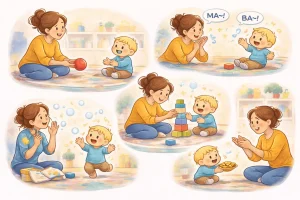Pretend Play Ideas to Boost Speech Development in Toddlers
By Wellness Hub
Last Updated: July 15, 2025
Is your toddler pouring invisible tea or pretending to fix a toy car? That’s not just cute — it’s powerful learning in action. Pretend play (also called imaginative or role play) helps your child build important speech and language skills in a natural, playful way. Through make-believe games, children learn new words, form sentences, and practice conversations — all while having fun.
If you’re wondering how to help your child talk more at home, pretend play is a great place to start. And the best part? You don’t need fancy toys or a lot of time. With a few simple ideas, you can turn everyday moments into opportunities for speech growth.
What is Pretend Play and Why It Matters for Speech Development
What is pretend play or imaginative play?
Pretend play, also called imaginative play or make-believe play, is when your child uses their imagination to act out different roles or stories. They might pretend to be a doctor giving a check-up, a shopkeeper selling vegetables, or a superhero saving the day.
These little scenarios might seem like just fun and games, but they’re actually a big part of your child’s development. For more ideas using daily routines, check out our speech therapy home activities designed for playful learning — and this is where magic happens for speech and language.
You don’t need fancy toys. A spoon can become a microphone, and a box can be a spaceship. What matters most is that your child is using their imagination, expressing ideas, and interacting — either with you or their toys — through words.
How pretend play supports speech and language skills
One of the biggest benefits of pretend play for language is how naturally it helps your child practice talking. When they pretend, they use words to describe actions, express ideas, and tell stories. They might say, “I’m making soup,” or ask, “Do you want some tea?” — all of which helps them build vocabulary and confidence in speaking.
Here’s how pretend play boosts speech skills:
- Vocabulary building: Kids learn new words as they label toys, describe actions, or repeat phrases they’ve heard.
- Sentence practice: Pretend play encourages longer and more complete sentences like “The teddy is sleeping” or “I’m going to the shop.”
- Storytelling skills: Children begin to sequence events and tell stories like, “First we go to the doctor, then we get better.” This is great for building grammar and thinking skills.
It also teaches social communication. When your child pretends with you or others, they practice turn-taking, asking and answering questions, and using polite phrases like “please” and “thank you.”
If your toddler isn’t talking much yet, adding simple pretend games into your routine — along with options like online speech therapy — is a gentle and playful way to help. And if you feel unsure where to start, platforms like Wellness Hub offer speech-building tips, home activity ideas, and expert support to guide you.
Key Speech Skills Built Through Pretend Play
Pretend play isn’t just fun — it’s a quiet powerhouse for building communication. While your child is pouring invisible tea or acting like a superhero, they’re also practicing the very skills they’ll use in real conversations. Let’s look at three important speech and language skills that grow through pretend play.
1. Expressive language – using words and phrases while playing
When your child speaks during play — whether they’re giving instructions, naming toys, or pretending to be someone else — they’re using expressive language. This is how they share their thoughts, needs, and stories.
For example, during a “restaurant” game, they might say:
- “I’m the chef today.”
- “Your food is ready!”
If your child is working on forming sentences, our WH questions flashcards can help them respond more confidently during play. Over time, this boosts their ability to speak clearly and confidently in everyday life.
2. Receptive language – understanding what others say during role play
Pretend play also supports receptive language, which is your child’s ability to listen and understand what others say. When you ask, “Can you serve the tea to teddy?” or “Where did the superhero go?”, your child learns to follow directions, answer questions, and respond to what’s being said.
This back-and-forth builds strong listening skills — and teaches them how language works in conversations. The more your child listens and responds during pretend games, the better their understanding and use of language becomes.
3. Turn-taking and conversation skills – learning to talk and listen
One of the most important communication skills children learn through play is how to have a conversation. Pretend play naturally teaches turn-taking, asking and answering, and staying on topic — all part of good conversation practice through play.
For example:
- Parent: “What should the patient eat after the medicine?”
- Child: “Only soup and juice!”
In just a short exchange, your child is learning how to listen, think, and reply — a big step in becoming a confident communicator.
Best Pretend Play Ideas to Boost Speech at Home
Looking for fun ways to help your child talk more? These pretend play ideas for speech delay are simple to set up and full of opportunities for language learning. You don’t need anything fancy — just a few toys (or even household items) and your imagination!
These games not only spark joy but also support speech development by helping kids use new words, practice conversations, and express their ideas more clearly.
Play kitchen or restaurant games
Set up a mini kitchen or restaurant using toy food, utensils, or even empty containers from your pantry. Let your child be the chef or waiter while you play the customer.
You can model and encourage words like:
- “Chop the carrot”
- “Stir the soup”
- “Would you like juice or milk?”
This kind of pretend play builds vocabulary for food, actions, and everyday routines — all in a fun and playful setting
Doctor or vet pretend play
Grab a toy stethoscope or use a spoon as one — and you’ve got a clinic ready to go! Your child can be the doctor, nurse, or vet, and stuffed animals make perfect patients.
Practice phrases like:
- “What’s wrong with your tummy?”
- “Let me check your ears.”
- “You need rest!”
To expand on this, explore our emotions flashcards that help toddlers label and express feelings during role play. It also helps children express empathy and understand others.
Supermarket shopping game
Line up items around the room, grab a basket or bag, and start shopping! Let your child pick out “milk,” “apples,” or “soap” while you play cashier or shop assistant.
Encourage speech with phrases like:
- “Can you find the bananas?”
- “How many eggs do we need?”
- “Please put it in the bag.”
This activity supports following directions, counting, and learning everyday item names. Plus, it can turn a boring chore into a playful, language-rich experience
Puppet shows or toy roleplay
Use finger puppets, soft toys, or even paper bags to put on a little show. Let the toys talk to each other — ask questions, solve problems, or go on pretend adventures.
You might hear your child say:
- “Let’s go to the park!”
- “Are you feeling happy today?”
- “Oh no, the bear is lost!”
Puppet play builds storytelling, emotional expression, and helps your child practice back-and-forth dialogue. It’s a wonderful way to help shy or late-talking children open up.
Simple Tips for Parents to Support Speech During Pretend Play
If you’re wondering how to use pretend play to improve toddler speech, the good news is — you already have what you need. Just a little time, imagination, and connection with your child go a long way.
Here are a few easy ways you can gently support speech while playing at home:
Use short and clear sentences
Children understand simple language best. When you’re playing, speak in short, clear phrases like:
- “The baby is sleeping.”
- “Let’s cook dinner.”
- “You are the doctor.”
This makes it easier for your toddler to follow what’s happening — and start copying your words. Over time, they’ll begin building their own sentences too.
Repeat and model correct phrases
Instead of correcting your child directly, repeat what they say — but in the right way.
For example:
- If your child says “dog eat,” you can say: “Yes, the dog is eating.”
This gentle modeling teaches grammar and sentence structure without pressure. Hearing the correct version helps them pick it up naturally.
Follow your child’s lead in play
Let your child choose what to play and how to play it. If they want to turn the doctor kit into a space station — go with it! When kids lead the play, they’re more engaged and more likely to talk.
Your role? Join in, listen, and respond. This shows them that their ideas matter — and encourages even more communication.
Ask open-ended questions like “What happens next?”
Instead of yes/no questions, try ones that invite your child to think and speak more. For example:
- “What should we cook next?”
- “Where is the teddy going now?”
- “What happens next in the story?”
These kinds of questions open the door to storytelling, reasoning, and longer sentences.
Keep it fun and pressure-free
Pretend play should always feel safe and joyful — not like a lesson. Don’t worry if your child isn’t saying much yet. Just being present, talking with them, and having fun makes a big difference.
Even quiet play is building their thinking and language skills in the background. Every word, sound, and smile counts.
Conclusion
You can boost toddler speech at home with just a few minutes of pretend play each day. Simple games like playing doctor or running a toy kitchen can help your child learn new words and talk more. No special tools needed — just your time and imagination. Keep it fun, follow your child’s lead, and talk while you play. Small steps every day make a big difference. For easy speech tips and home activities, explore our Play-Based Speech Programs at Wellness Hub today!
Frequently Asked Questions:
1. How does pretend play help with speech development?
Pretend play gives your child a fun way to use and practice language. When they act out daily routines — like cooking, shopping, or being a doctor — they naturally learn new words and try different sentence structures. It also encourages your child to speak more often, describe things, and even tell little stories. These are all key parts of speech and language development.
2. What are some easy pretend play ideas for speech delay?
Some great pretend play ideas for speech delay include:
- Running a toy kitchen or restaurant
- Doctor or vet role play with soft toys
- Puppet shows using hand or finger puppets
- Pretend shopping using household items
These activities help children hear and practice real-life words in a fun, low-pressure way. You don’t need expensive toys — just your time and imagination.
3. When should I start pretend play with my toddler?
You can start pretend play as early as 18 months. At this age, many toddlers begin pretending to feed dolls, use toy phones, or imitate what adults do. These simple actions are the first signs of imagination and are great for speech growth. As they get older, their pretend stories become more detailed, helping them build longer sentences and stronger vocabulary.
4. Can pretend play help a late talker?
Yes, pretend play is very helpful for late talkers. It creates a natural setting where your child can hear new words and use language in fun ways. Since play feels relaxed and enjoyable, children are more likely to try talking. You can gently support them by joining their play, describing actions, and modeling short phrases like “The dog is eating” or “Let’s go to the shop.”
5. How often should I do pretend play with my child?
Just 10–15 minutes a day of pretend play can make a big difference. The key is to do it regularly. Even short play sessions, when done daily, help your child hear new words, practice talking, and build confidence. You can fit it into your routine — during bath time, mealtime, or just before bed.
6. What toys are best for pretend play and language learning?
The best toys for pretend play are often the simplest ones:
- Toy food, utensils, or kitchen sets
- Doctor kits or stethoscopes
- Animal figures or dolls
- Puppets or stuffed toys
- Empty boxes, containers, or cloth
These toys allow children to act out daily life and talk about what they’re doing. You can also use household objects — like a spoon for a microphone or a basket for shopping.
7. How do I talk during pretend play to help my child speak more?
Keep your language short, simple, and clear. Say what you’re doing: “I’m making tea.” Repeat your child’s words and add to them: If your child says “car,” you can say, “Yes! A red car!” Ask open-ended questions like, “What should we do next?” or “Where is the teddy going?” These prompts help your child think, speak, and build sentences.
8. My toddler doesn’t talk during play. What should I do?
Don’t worry if your child is quiet during play. Every child is different, and some take more time to start speaking. Keep playing, talking, and modeling words without pressure. Your child is still learning by watching and listening. Over time, they may start copying your words or adding their own ideas into the play. Celebrate even small attempts to talk.
9. Can pretend play improve communication skills?
Absolutely. Pretend play teaches children how to take turns, listen, respond, and express feelings. These are all part of good communication. When kids act out roles like a doctor or shopkeeper, they learn how to ask and answer questions, use polite words like “please” and “thank you,” and carry on back-and-forth conversations.
10. Where can I get more support to boost toddler speech at home?
If you’re looking for expert support, simple play ideas, or structured help, check out Wellness Hub. They offer trusted speech programs, tools, and home-based activities created by therapists — all designed to help parents support their child’s speech through everyday play. Whether your child has a delay or just needs a little boost, Wellness Hub is here to guide you.
About the Author:
Shravanaveena Gajula
M.Sc ., Speech and Language Pathology (5+ years of experience)
Shravanaveena Gajula is a dedicated Speech-Language Pathologist with a BASLP and an M.Sc in Speech and Language Pathology. With experience spanning multiple settings, including Wellness Hub , Veena specializes in a wide range of disorders from developmental issues in children to speech and language assessments in adults. Her expertise includes parent counseling, managing speech sound and fluency disorders, and creating individualized therapy programs. Veena is also PROMPT certified and an author of several insightful blogs on speech and language pathology, aiming to educate and assist caregivers in supporting their loved ones.
Book your Free Consultation Today
Parent/Caregiver Info:
Client’s Details:
* Error Message









